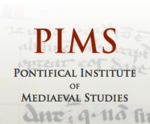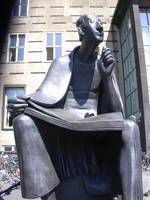
17.08. Summer School EGSAMP h. 9.00 (Ohrid, Macedonia)
Francesca Bonini: Against Thomas' adversaries: William of Peter of Godin defending the doctrines of Aquinas
Between the end of the 13th and the first decades of the 14th century condemnations and censures characterized the academic context and even a distinguished theologian as Thomas Aquinas -nowadays considered a symbol of the Catholic orthodoxy- was not spared from criticism. William of Peter of Godin (Guil(l)elmus Petri de Godino), one of the most influential personalities of the Dominican Order between the end of 13th and the first decades of 14th century can be considered one of the first Thomists engaged in the conservation of Aquinas' thought. The aim of his Lectura Thomasina was not only giving an account of Aquinas' thought but also defending the venerabilis doctor Thomas - as Guillaume defines Aquinas - from his critics and opponents such as Henry of Ghent Gilles of Rome and William De La Mare.

01.10. Cologne-Toronto Graduate Student Colloquium 2016 h. 10.30 (Toronto, Canada)
Francesca Bonini: The Manuscript Tradition of the Lectura Thomasina
The aim of this presentation is to share some results of my analysis of the Lectura Thomasina of William of Peter of Godin. I will examine the manuscript tradition and some issues related to the edition and give an account of the editorial principles used to edit the text.

28.06. Forschungskolloquium 18.00 Uhr (Universität zu Köln, Thomas-Institut, Seminarraum im EG)
"Wie der Titel meines Exposé andeutet, bildet den Kern meines Beitrag das heikle Problem der Ewigkeit der Welt. Ich möchte Ihnen zeigen, wie Wilhelm Petrus von Godino in seinem Lectura Thomasina auf dieses Thema eingeht. Die Behandlung dieser Problematik – wie Sie sehen werden – ermöglicht einige wichtigen Anmerkungen zu den Quellen und, vor allem, zur handschriftlichen Tradition des Texts".